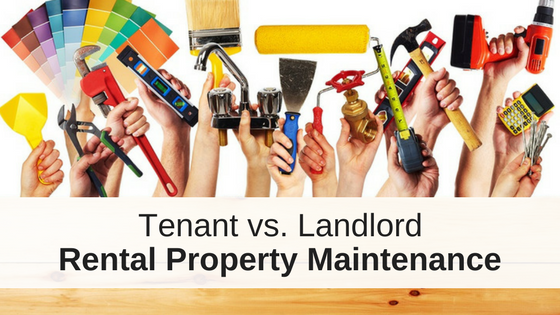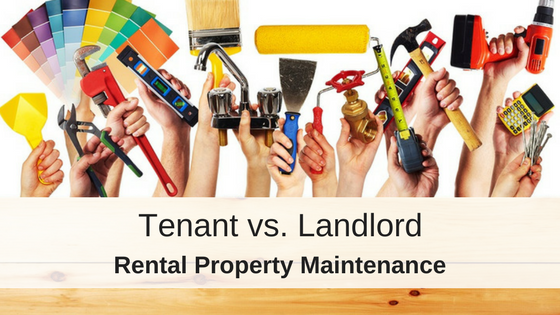
One of the benefits of renting includes the option for tenants to defer home maintenance to the property owner or management company. When a pipe bursts or an appliance starts acting up, a renter simply needs to put in a call to their manager or landlord to fix the problem.
While it may be true that owners and managers are required to keep up with most property maintenance, there are some areas of maintenance that become the tenant’s responsibility. Your tenants are expected to keep the property clean, dispose of trash properly, and need to avoid deliberate or negligent damage to the property.
Most lease agreements require that a property should be returned in the same condition it was at the beginning of the lease term. Upon vacating a unit, if any damage is discovered or cleaning is required to return it a habitual state the expenses can be deducted from the tenant’s security deposit.
Tenant Maintenance Responsibilities
While it may seem obvious to you, some renters just don’t realize their responsibilities when it comes to maintaining their rental property. In order to help them be successful, and to keep your property properly maintained, go over your expectations with them during the lease signing process and consider providing a handout as part of their move-in welcome package.
Your tenants’ maintenance responsibilities should be outlined in your rental agreement so they understand their contractual obligation in regards to maintaining the property properly. Including your maintenance expectations in your lease agreement gives you leverage if your tenants damage the property and refuse to pay for repairs. Check out this Renter Maintenance Checklist to provide your tenants.
Landlord vs. Tenant Maintenance
Most lease agreements and landlord-tenant laws follow the expectation that if a tenant causes property damage they are responsible for financing the repairs. Common damage that could be caused by a tenant and repaired with tenant funds include broken windows, holes in the wall, or damaged carpets.
Tenants are not responsible for fixing problems like leaky roofs, cracked foundations but are required to inform their property manager about maintenance issues so they can make proper repairs and prevent further damage.
Waste Management
One of the most important issues to address with your tenants is waste management. While you cannot require your tenants to have spotless homes, you can include lease terms in regards to the proper way to manage garbage by making it your tenant’s responsibility to properly dispose of any trash on the premises that could contribute to pest infestations.
Property maintenance can also become a shared responsibility between the landlord and tenant and specifics should be outlined in the lease agreement.
Plumbing, heating and air conditioning
- Landlord : The landlord should keep these systems in working order, and fixing any of these qualify as a owner responsibility.
- Tenant: Tenants are responsible for using these fixtures properly and for reporting any issues to prevent further damage. The residential lease agreement may also assign responsibility for keeping pipes clear and replacing air filters as necessary to the tenant. While the owner is required to fix these systems, if it was discovered to be defective due to negligence, like flushing a diaper, the tenant could be held responsible.
Smoke detectors, fire alarms and carbon monoxide detectors
- Landlord: Property owners are typically required to provide and maintain safety features and replace or repair them as needed.
- Tenant: A lease agreement may require tenants to replace batteries and test these systems to make sure they are working properly.
Management of known toxins
- Landlord: Federal law dictates that the landlord must warn the tenant of the presence of lead paint dust, asbestos and mold in the rental property and that the landlord must manage such toxins to ensure they do not pose a health danger to the tenant.
- Tenant: The lease can require tenants use proper ventilation systems and ways to clean mold should any be discovered during tenancy.
Appliances
- Landlord: If the rental lease agreement includes mention of an appliance, the landlord must keep it in working order.
- Tenant: If the tenant causes damage to the appliance, however, the landlord may deduct the amount paid for repair from the security deposit.
Pest control
- Landlord: Owners are typically required to take responsibility for pest control if there is an infestation.
- Tenant: The tenant must keep the property sanitary as to not invite infestation. If the tenant does not keep a clean home, the landlord may deduct the amount paid for extermination from the tenant’s security deposit per the lease.
Landscaping
Landscaping requirements can fall on either the property manager, owner or tenant per the lease agreement.
- Landlord: Landscaping becomes the landlord’s responsibility if an unmaintained property if it violates local laws or homeowners’ association rules. It is also a good idea for the owner to take responsibility for Keeping bushes trimmed to prevent fire hazards to the property.
- Tenant: If the landlord assigned landscaping maintenance to the tenant in the lease, the landlord may pass on to the tenant any fines received from violating local laws or HOA rules.
Common areas
- Landlord: The landlord must keep all common areas of a multi-unit residential property safe and clean, provide appropriate trash receptacles and arranging for regular pickup. Elevators and other common-use systems also fall under a landlord’s area of responsibility.
- Tenant: Tenants are required to follow property rules in regards to cleaning up after themselves in common areas and not misusing equipment, like the gym or pool area.
